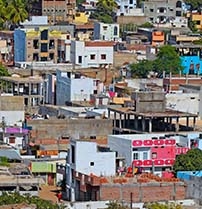Abstract
We deploy a socio-spatial approach and use a spatially representative survey that we conducted in Hyderabad and Mumbai to analyze the relation between city space and religion. After documenting the relative status of religious groups in urban India and different types of cities using secondary databases, we identify poor-ghettos and elite-enclaves in Hyderabad and Mumbai. In both cities, ghettos have a high proportion of Muslims, while enclaves are dominated by non-Muslim inhabitants. Ghettoization of Muslims is far more pronounced in Hyderabad than in Mumbai. A key finding on the relation between city space and religion is that compared to segregated neighborhoods, mixed (“grayer”) neighborhoods produce better economic outcomes like lower poverty. We argue that while Indian cities are becoming less integrated along religious lines over the last 3-4 decades, this process is far from complete, and needs to be reversed.



